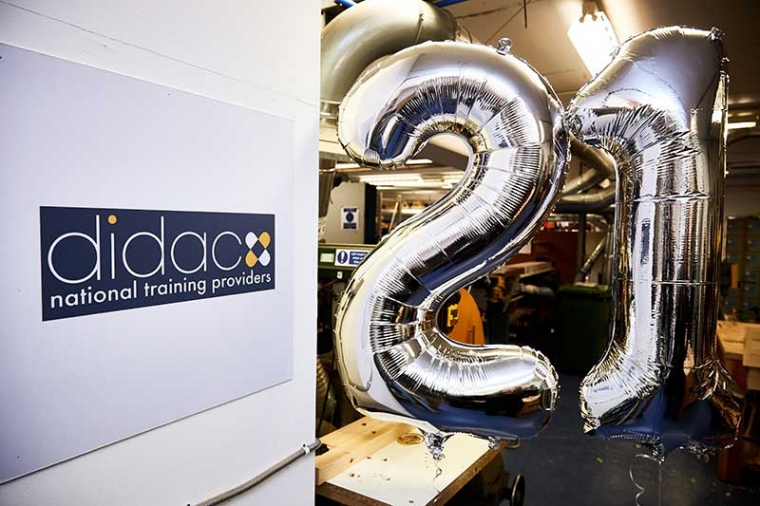Successful Bristol-based training business, Didac, is recognised as the UK’s national provider of specialist training to the furniture, timber and merchant trades. In the first of a series of articles, Didac’s managing director Jon Gibson and commercial director, Martin James talk exclusively to Furniture & Joinery Production about how the business began and how it continues to evolve at a time when acute demand for skilled staff is clear.
Didac directors Jon Gibson and Martin James first met in 1996, when Jon borrowed a Rye CNC router for the apprentice stand that he was running for the Woodmex show. By coincidence, three weeks prior to the exhibition, the board of Rye Machinery had decided to set up a training company, which culminated in the formation of Didac in June 1997.
At that time, Martin was managing director of Rye Machinery. He recalls: “After talking to Jon for three minutes, I knew he had the educational skills in furniture, woodworking and wood machining to lead the training company, so we teamed up from there.”

Didac currently has a team of 25 trainers located throughout the country
From the outset, Didac’s mission was to improve the skills, productivity and safety in the furniture and woodworking sectors. That same mission is still the same today, but it’s achieved in an increasing number of ways.
Jon and Martin have seen the evolution of sector initiatives, having sat on a variety of wood sector training committees including Wood Industry Forum, Shopfitters Independent Training Forum, Wood Industry Group, Qualifications Reform Group, Proskills Wood Industry Board, Wood Safety Group (made up of trade associations) and the HSE – and more recently the Furniture and Interiors Skills Training Alliance.
Over the years, they have seen faces and organisations come and go, but either Jon or Martin has been a constant presence around the table. This has given them an unrivalled vision of skills development in the sector.
They are still very much involved in sector initiatives including those being worked on by Wood Industry Training Forum and the Furniture and Interiors Education Skills Training Alliance, which is on the cusp of setting up what Martin describes as a major initiative in skills development in the furniture and interiors sector, which takes advantage of the new funding rules for apprenticeships. The Wood Safety Group is also taking a new direction, with the group taking more proactive ownership of health and safety in the sector.
As an indication of Didac’s impact on the sector, in the last 12 months, Didac has trained around 3000 individuals in wood machining skills on its short-course programme; and has trained a similar number in plant equipment and vehicle movement training.
Didac currently has a team of 25 trainers located throughout the country delivering their extensive range of training programmes including wood and furniture skills, health and safety, plant equipment, vehicle movement through to management training. Currently, Didac has approximately 200 apprentices in training. All are employed, and all follow a minimum 12-month training programme, with the average length being around 16 months.
And training is not just for younger trainees either. Jon’s view of wood machine training for senior wood machinists is robust: “I don’t believe in that old chestnut that you can’t teach an old dog new tricks – oh yes you can!” he asserts.
Jon explains that some employers are concerned about how external trainers will be received by time-served wood machinist. “We understand that, but we know from experience that everyone gets something out of the training sessions we deliver.

In 21 years Didac has had the equivalent of seven Ofsted inspections – on all occasions, the training provision was judged as 'good' or 'outstanding'.
“The fact of the matter is that bad habits and short-cuts become second nature and without refresher training, which should be undertaken every three to five years, it can often become embedded behaviour, which becomes even more dangerous if it’s passed on to the next generation of wood machinists, as can frequently be the case.”
Didac’s business model intrigues many, because most training providers are either 100% short-course training or 100% apprentice training. Didac has a healthy split of around 50/50, which means it can offer the right course for the right situation – from a few days for short-courses, three to six months for NVQs, practical on-the-job training – and typically 12-24 months on a full apprenticeship programme.”
“Around 90% of our training is delivered in the work-place,” explains Martin, “this means Didac learners receive direct instruction and are assessed on the equipment, materials and products they work with day in day out.
Jon says: “There is no hiding place for our trainers when they are in the client workshops, so it’s very important to us that we employ trainers who not only have the right skills, but they also need the right occupational experience as well, so they have bench speed in what they do. This provides confidence on the training we deliver.
“In 2011 we started our study programme for 16-18 year-olds as we are passionate about igniting interest in school students and working with the local community in Bristol. The course offers an alternative to sixth form or college and works with smaller groups of students interested in this industry.
“We also work with local hospital schools supporting those students that have the skill set but not always the confidence to approach further education easily.
“Thus far this has been a huge success and in 2017, we were able to double numbers due to the high interest and this resulted in many students being placed with local companies on apprenticeships and on progression programmes with us,” says Jon. “We also introduced a school programme to work with local secondary schools and those students that are home-schooled, to assist them in returning to peer environments.”
When it comes to running the business, Jon and Martin have always agreed on strategy, because they have a very good understanding of the skills gaps in the furniture and woodworking sectors, which stems from their background when at the age of 16 and 18 respectively they first joined the furniture industry.
Martin explains: ”We have always consulted and listened to industry’s needs; and helped close the skills gap through partnership working to help develop executable action plans.”
He adds: “We don’t always agree in the more detailed execution of our plans, but over the years we have worked out that’s what makes us a good team. We are always trouble-shooting, trying to improve; and reinventing ourselves to make sure we match our business services and delivery models to the needs of our clients. Our ultimate mantra is to be the best – as judged by you, which means anyone using our services or auditing.
“Talking of teams, we have recently expanded our leadership team with the appointment of Elaine Stanley as operations manager. Elaine joined Didac in 2008 and has been a critical support for Jon and myself ever since.”
Elaine describes her role as far reaching: “The most challenging element is being the umpire when Jon and Martin can’t agree, but an accommodation is usually achieved in good spirits – only joking!”
“When I joined Didac, I had no idea of how complicated the compliance side of training can be,” Elaine explains: “Some is self-imposed so that we are absolutely certain that our training is up to standard, but we are externally audited almost once per month throughout the year by a whole host of organisations.
“Didac is not only unusual because it delivers a mix of funded training and short-course commercial training, but because we insist on applying the same quality procedures to commercial training as well as funded training. I don’t know of another training provider who does that."
“ ‘You’ is the key variable,” she says, “clearly the learners are the most important ‘you’, but we are also judged by their employers, trade associations; the awarding bodies who control the qualifications we deliver, right the way through to Ofsted who is the ultimate judge of training quality.
“In 21 years we have had the equivalent of seven Ofsted inspections. On all occasions, our training provision has been judged as good or outstanding. We are very proud of that.”
As for the future, Martin comments: “Opening another academy somewhere else in the country is not out of the question, but the work-based skills development model we have developed is so versatile and convenient for employers, so that’s our focus in the short term to make sure we help furnituremakers take advantage of the new flexibilities in apprenticeship training, wherever they are located.”
He adds: “We would like to increase our presence in the upholstery and sewing sectors, where we know there is demand from employers, but a shortage of learners and training providers to support their skills development, so look out for a fresh initiative there.”









